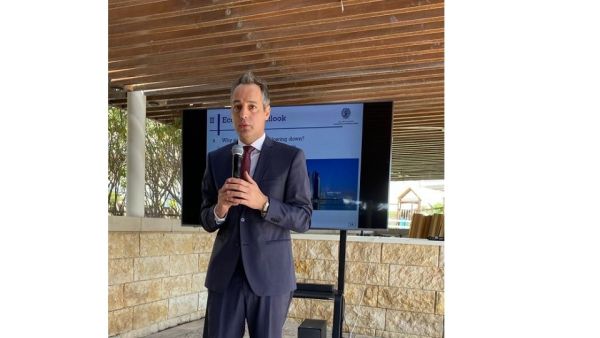Georgetown Professor at QF Cites Qatar’s Early Response To Pandemic as Key To Economic Recovery

Ambassadors of the 17 different European Union (E.U.) member states in Qatar were recently briefed on the state of Qatar’s economy as well as the impact of the COVID-19 pandemic at a talk by Dr. Alexis Antoniades, Associate Professor and Director of International Economics at Georgetown University in Qatar (GU-Q), a Qatar Foundation-partner institution.
In his talk, titled “Qatar’s Economy Post-COVID,” Dr. Antoniades cited Qatar’s ability to contain the spread of the pandemic, including early measures taken to support local businesses and to tighten the State’s budget to control unnecessary expenses, as key measures that “helped shield the economy to some degree, and enhance the likelihood that the post-COVID economy will recover quickly.” These measures, he said, “helped constrain the pandemic’s adverse impact on businesses and state finances that were felt in economies across the world.”
The GU-Q economics expert was hosted by the ambassador of the Federal Republic of Germany in Qatar and the chair of the local E.U. presidency, H.E. Dr. Claudius Fischbach, in cooperation with the ambassador of Cyprus, H.E. Dr. Michalis A. Zacharioglou. He began by discussing the strategic framework of Qatar’s economic priorities, which he said includes “the need to diversify the economy and preserve wealth for future generations, create enough private-sector jobs for a young population, and attract foreign direct investment into the country.”
Regarding the current economic slowdown, Dr. Antoniades cited several contributing factors including the drop in oil prices since the end of 2015, a drop in purchasing power, and a phasing out of spending on massive infrastructure projects as they near completion, stressing the point that “these trends are not caused by the blockade.” Instead, the blockade offered authorities in Qatar “the opportunity to push fast policies and initiatives aimed at strengthening the regulatory and legal framework for foreign investors and at establishing local manufacturing.”
Looking ahead, Dr. Antoniades highlighted the need for diversification by focusing on sectors where Qatar has competitive advantage, including “operating the shipyard for a growing fleet of LNG carriers, establishing a hub in the two smart cities Msheireb Downtown Doha and Lusail for autonomous vehicles research and development, and exploiting the presence of world class universities to deliver programs on data analytics and artificial intelligence, thus capturing a significant market share of the global demand for such skills.”
He concluded his presentation by encouraging the ambassadors to explore the potential for future collaborations with various initiatives and institutions in Qatar, including Qatar Financial Center, the Qatar Foundation, Qatar Science and Technology Park, the Free Zones Authority, and the newly established Qatar Investment Promotion Agency, among others.
Background Information
Georgetown University in Qatar
Established in 1789 in Washington, DC, Georgetown University is one of the world’s leading academic and research institutions. Georgetown University in Qatar (GU-Q), founded in 2005 in partnership with Qatar Foundation, seeks to build upon the world-class reputation of the university through education, research, and service. Inspired by the university’s mission of promoting intellectual, ethical, and spiritual understanding, GU-Q aims to advance knowledge and provide students and the community with a holistic educational experience that produces global citizens committed to the service of humankind.
Located in Doha’s Education City, GU-Q offers the same internationally recognized Bachelor of Science in Foreign Service degree as Georgetown’s Capitol Campus in Washington, DC. This unique, interdisciplinary program prepares students to tackle the most important and pressing global issues by helping them develop critical thinking, analytic, and communication skills within an international context. GU-Q alumni work in leading local and international organizations across industries ranging from finance to energy, education, and media. The Qatar campus also serves as a residency and delivery location for the Executive Master’s in Emergency and Disaster Management along with the Executive Master’s in Leadership.







